Unit 4 Natural disasters Assessing Your Progress课件(17页) 2024-2025学年高一英语人教版(2019)必修第一册
文档属性
| 名称 | Unit 4 Natural disasters Assessing Your Progress课件(17页) 2024-2025学年高一英语人教版(2019)必修第一册 | 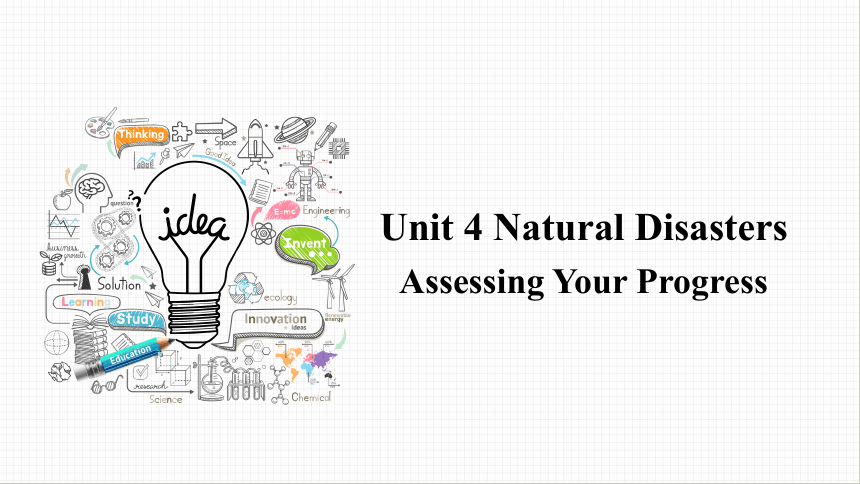 | |
| 格式 | pptx | ||
| 文件大小 | 54.0MB | ||
| 资源类型 | 教案 | ||
| 版本资源 | 人教版(2019) | ||
| 科目 | 英语 | ||
| 更新时间 | 2024-10-09 16:25:17 | ||
图片预览

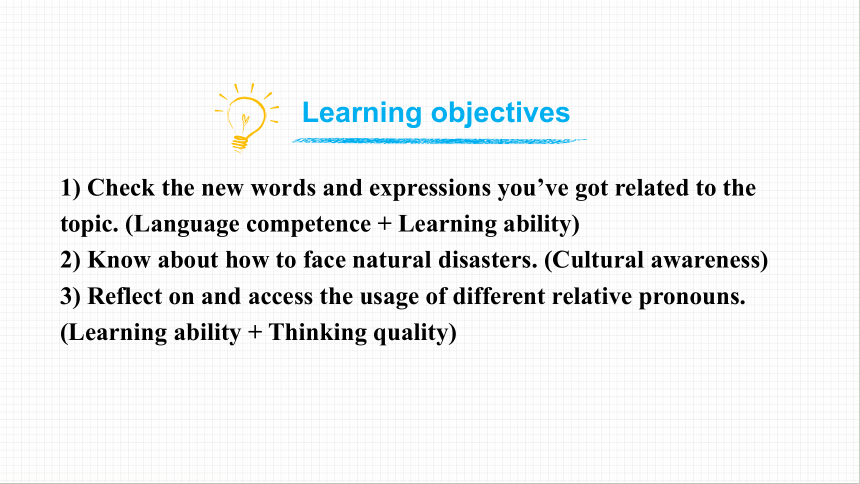
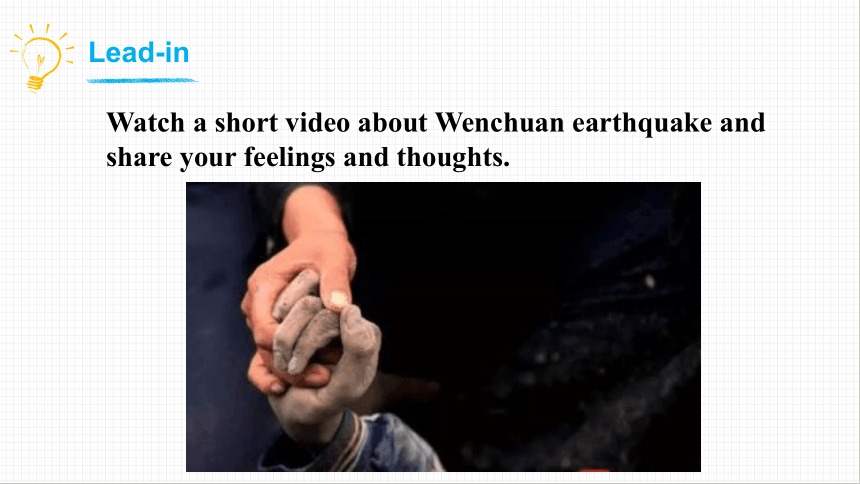
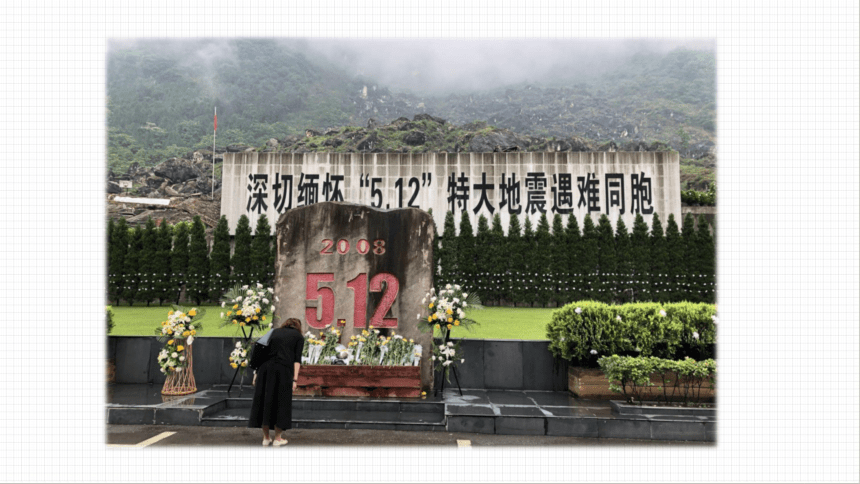
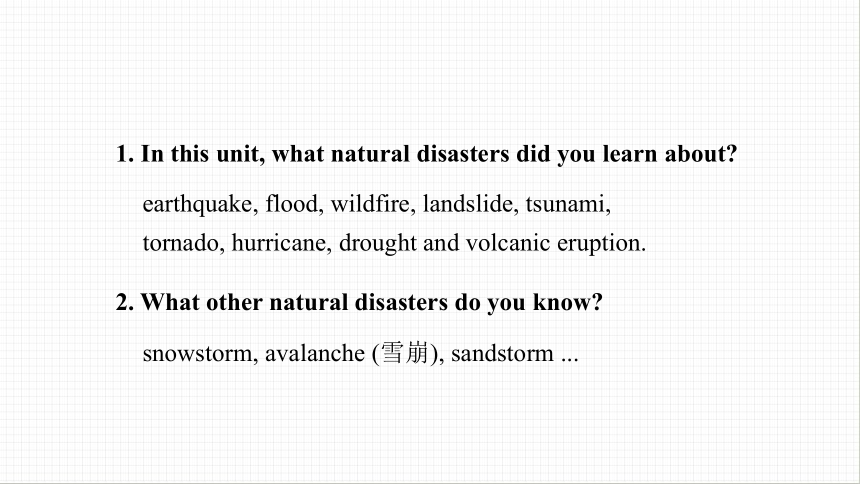
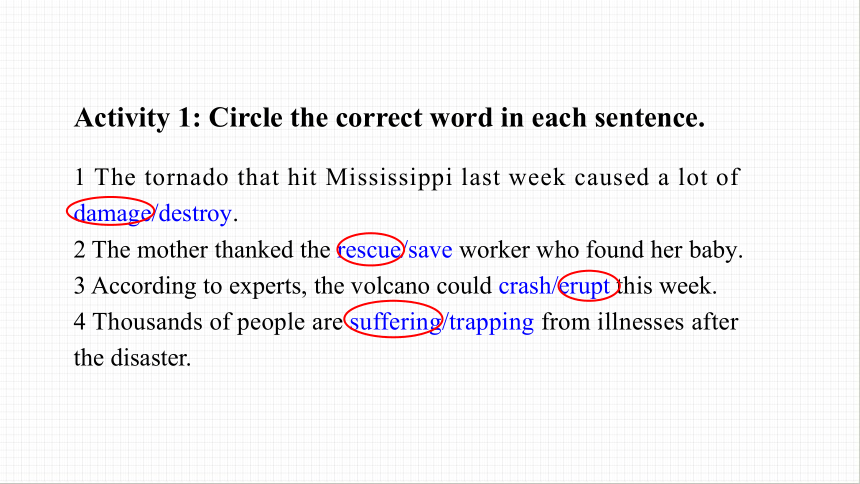
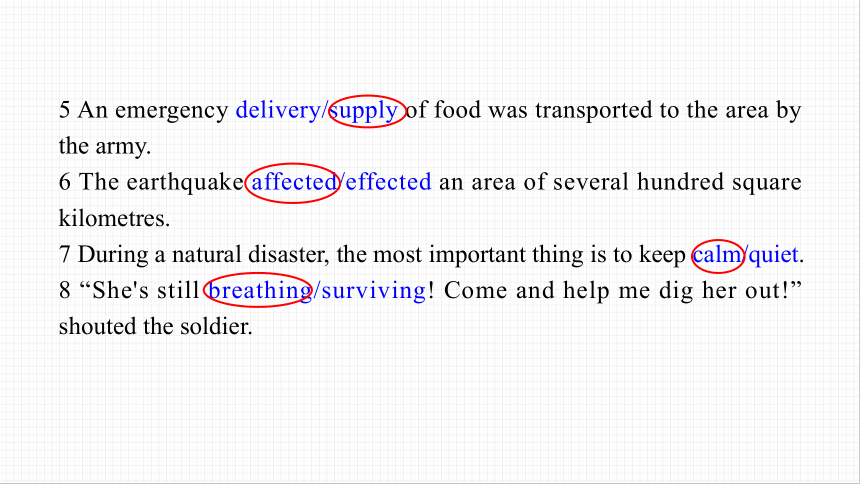
文档简介
(共17张PPT)
Unit 4 Natural Disasters Assessing Your Progress
1) Check the new words and expressions you’ve got related to the topic. (Language competence + Learning ability)
2) Know about how to face natural disasters. (Cultural awareness)
3) Reflect on and access the usage of different relative pronouns. (Learning ability + Thinking quality)
Learning objectives
Watch a short video about Wenchuan earthquake and share your feelings and thoughts.
Lead-in
1. In this unit, what natural disasters did you learn about
2. What other natural disasters do you know
earthquake, flood, wildfire, landslide, tsunami,
tornado, hurricane, drought and volcanic eruption.
snowstorm, avalanche (雪崩), sandstorm ...
Activity 1: Circle the correct word in each sentence.
1 The tornado that hit Mississippi last week caused a lot of damage/destroy.
2 The mother thanked the rescue/save worker who found her baby.
3 According to experts, the volcano could crash/erupt this week.
4 Thousands of people are suffering/trapping from illnesses after the disaster.
5 An emergency delivery/supply of food was transported to the area by the army.
6 The earthquake affected/effected an area of several hundred square kilometres.
7 During a natural disaster, the most important thing is to keep calm/quiet.
8 “She's still breathing/surviving! Come and help me dig her out!” shouted the soldier.
Tip 1. 词性
damage n. & v. destroy v.
rescue n. & v. save v.
affect v. effect n.
Tip 2. 精准的汉语释义
damage损 destroy毁
delivery运送 supply供应
calm不慌 quiet不语
Vocabulary 辨析
Tip 3. 语境使用范围
erupt (a volcano erupts)
crash (a plane, car or computer even people can crash)
Tip 4. 英文释义+精准的汉语释义
breathe: to take air into your lungs and send it out again 呼吸
survive: to not die in an accident or war or from an illness 幸存;幸免于
Vocabulary 辨析
Activity 2: Read the passage and fill in the blanks with relative pronouns
The people ______live in Wenchuan county will never forget the day 12 May, 2008. The 8.0-magnitude earthquake __________ killed over 80,000 people and left many more injured turned many towns and counties into ruins. The rescue work __________ followed was carried out by people from all over the country, and even abroad.
who
which/that
that/which
Now, more than 10 years on, the people _________ suffered the earthquake are living a new life. Many live in new towns __________ are earthquake-safe, in local communities ___________ have been beautifully rebuilt by the government. The people will never forget those _________ rescued them and helped them rebuild their home. Out of gratitude, many young adults _________ were students during the earthquake have chosen to study medicine or join the army in a wish to help more people. Wenchuan, the county ___________ was completely destroyed and then completely rebuilt, has become a symbol of the Chinese spirit of never giving up.
who
that/which
that/which
who
who
which/that
定语从句:在复合句中作定语, 修饰名词或代词的从句。被定语从句修饰的词叫先行词。
关系代词:that, who, whom, whose, which
关系副词:where, when, why (unit 5)
Assessing for grammar
The structure of restrictive relative clauses
定义: 在复合句中, 修饰名词或代词的从句叫定语从句。
Two thirds of the people who lived there were dead or injured.
先行词
关系词
从句
关系代词
关系副词
which, who, whom, whose, that, as
where, when why
关系代词 指代 从句中的成分
that 人/物 主语/宾语/表语
which 物 主语/宾语/表语
who 人 主语/宾语/表语
whom 人 宾语
whose 人/物 定语
Assessing for grammar
Activity 3: Read the passage again and find out the main idea of each paragraph.
Paragraph 1: ___________________________________
___________________________________
Paragraph 2: ___________________________________
___________________________________
People in Whenchuan never forget
the earthquake on 12 May, 2008.
People are living a new life now.
Activity 4: Write a summary for the passage.
Summary: People in Wenchuan never forget the earthquake on 12 May, 2008. Now, they are living a new life with gratitude to rescue workers. Wenchuan has become a symbol of the Chinese spirit of never giving up.
Activity 5 Reflecting
1.What did you learn about natural disasters in this unit that you did not know before
2.What else do you want to know about natural disasters
3.What did you find the most difficult in this unit
4.What in this unit motivated you most
5.Overall, I thought this unit was:
interesting useful so-so difficult
Think about the following questions.
1. Complete the unit summary, assessment and reflection form. (See the complete the version in the next period.)
2. Write a short passage about one of the natural disasters that you’ve experienced in 60 words. Try to use as many attributive clauses as you can.
3. Arrange notes to consolidate the new language items learning in this period.
Homework
Unit 4 Natural Disasters Assessing Your Progress
1) Check the new words and expressions you’ve got related to the topic. (Language competence + Learning ability)
2) Know about how to face natural disasters. (Cultural awareness)
3) Reflect on and access the usage of different relative pronouns. (Learning ability + Thinking quality)
Learning objectives
Watch a short video about Wenchuan earthquake and share your feelings and thoughts.
Lead-in
1. In this unit, what natural disasters did you learn about
2. What other natural disasters do you know
earthquake, flood, wildfire, landslide, tsunami,
tornado, hurricane, drought and volcanic eruption.
snowstorm, avalanche (雪崩), sandstorm ...
Activity 1: Circle the correct word in each sentence.
1 The tornado that hit Mississippi last week caused a lot of damage/destroy.
2 The mother thanked the rescue/save worker who found her baby.
3 According to experts, the volcano could crash/erupt this week.
4 Thousands of people are suffering/trapping from illnesses after the disaster.
5 An emergency delivery/supply of food was transported to the area by the army.
6 The earthquake affected/effected an area of several hundred square kilometres.
7 During a natural disaster, the most important thing is to keep calm/quiet.
8 “She's still breathing/surviving! Come and help me dig her out!” shouted the soldier.
Tip 1. 词性
damage n. & v. destroy v.
rescue n. & v. save v.
affect v. effect n.
Tip 2. 精准的汉语释义
damage损 destroy毁
delivery运送 supply供应
calm不慌 quiet不语
Vocabulary 辨析
Tip 3. 语境使用范围
erupt (a volcano erupts)
crash (a plane, car or computer even people can crash)
Tip 4. 英文释义+精准的汉语释义
breathe: to take air into your lungs and send it out again 呼吸
survive: to not die in an accident or war or from an illness 幸存;幸免于
Vocabulary 辨析
Activity 2: Read the passage and fill in the blanks with relative pronouns
The people ______live in Wenchuan county will never forget the day 12 May, 2008. The 8.0-magnitude earthquake __________ killed over 80,000 people and left many more injured turned many towns and counties into ruins. The rescue work __________ followed was carried out by people from all over the country, and even abroad.
who
which/that
that/which
Now, more than 10 years on, the people _________ suffered the earthquake are living a new life. Many live in new towns __________ are earthquake-safe, in local communities ___________ have been beautifully rebuilt by the government. The people will never forget those _________ rescued them and helped them rebuild their home. Out of gratitude, many young adults _________ were students during the earthquake have chosen to study medicine or join the army in a wish to help more people. Wenchuan, the county ___________ was completely destroyed and then completely rebuilt, has become a symbol of the Chinese spirit of never giving up.
who
that/which
that/which
who
who
which/that
定语从句:在复合句中作定语, 修饰名词或代词的从句。被定语从句修饰的词叫先行词。
关系代词:that, who, whom, whose, which
关系副词:where, when, why (unit 5)
Assessing for grammar
The structure of restrictive relative clauses
定义: 在复合句中, 修饰名词或代词的从句叫定语从句。
Two thirds of the people who lived there were dead or injured.
先行词
关系词
从句
关系代词
关系副词
which, who, whom, whose, that, as
where, when why
关系代词 指代 从句中的成分
that 人/物 主语/宾语/表语
which 物 主语/宾语/表语
who 人 主语/宾语/表语
whom 人 宾语
whose 人/物 定语
Assessing for grammar
Activity 3: Read the passage again and find out the main idea of each paragraph.
Paragraph 1: ___________________________________
___________________________________
Paragraph 2: ___________________________________
___________________________________
People in Whenchuan never forget
the earthquake on 12 May, 2008.
People are living a new life now.
Activity 4: Write a summary for the passage.
Summary: People in Wenchuan never forget the earthquake on 12 May, 2008. Now, they are living a new life with gratitude to rescue workers. Wenchuan has become a symbol of the Chinese spirit of never giving up.
Activity 5 Reflecting
1.What did you learn about natural disasters in this unit that you did not know before
2.What else do you want to know about natural disasters
3.What did you find the most difficult in this unit
4.What in this unit motivated you most
5.Overall, I thought this unit was:
interesting useful so-so difficult
Think about the following questions.
1. Complete the unit summary, assessment and reflection form. (See the complete the version in the next period.)
2. Write a short passage about one of the natural disasters that you’ve experienced in 60 words. Try to use as many attributive clauses as you can.
3. Arrange notes to consolidate the new language items learning in this period.
Homework
